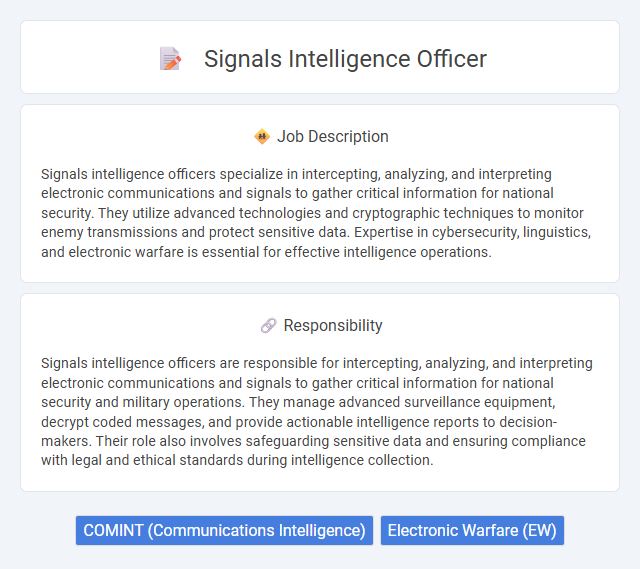
Signals intelligence officers specialize in intercepting, analyzing, and interpreting electronic communications and signals to gather critical information for national security. They utilize advanced technologies and cryptographic techniques to monitor enemy transmissions and protect sensitive data. Expertise in cybersecurity, linguistics, and electronic warfare is essential for effective intelligence operations.
Individuals with strong analytical skills, attention to detail, and the ability to work under pressure are likely to be well-suited for a Signals Intelligence Officer role. Those who possess high integrity, patience, and adaptability may find this job aligns with their personality and professional strengths. People who struggle with confidentiality or handling complex, high-stakes information might face challenges in this position.
Qualification
A Signals Intelligence Officer requires a strong background in computer science, cybersecurity, or electrical engineering, often paired with a security clearance due to the sensitive nature of the work. Proficiency in cryptography, signal analysis, and intelligence gathering techniques is essential, along with experience in interpreting electronic communications and intercepts. Candidates must demonstrate analytical skills, attention to detail, and the ability to operate advanced signal processing technology in military or intelligence environments.
Responsibility
Signals intelligence officers are responsible for intercepting, analyzing, and interpreting electronic communications and signals to gather critical information for national security and military operations. They manage advanced surveillance equipment, decrypt coded messages, and provide actionable intelligence reports to decision-makers. Their role also involves safeguarding sensitive data and ensuring compliance with legal and ethical standards during intelligence collection.
Benefit
Signals intelligence officers likely gain access to cutting-edge technology and classified information that enhances their analytical skills and career prospects. The role probably offers a competitive salary and comprehensive benefits package, including healthcare and retirement plans. Opportunities for advancement and specialized training may increase job security and professional development chances.
Challenge
A Signals Intelligence Officer likely faces complex challenges involving the interception, analysis, and interpretation of encrypted communications. The role probably requires advanced technical skills to operate sophisticated surveillance equipment and decode adversarial signals under high-pressure conditions. Navigating evolving cyber threats and maintaining operational security might present ongoing obstacles that demand continuous learning and adaptability.
Career Advancement
Signals intelligence officers develop expertise in intercepting and analyzing electronic communications, enhancing national security through critical information gathering. Career advancement involves progressing from junior analyst roles to senior operational positions, often requiring specialized training in cryptography, cybersecurity, and electronic warfare. Leadership opportunities expand into strategic planning and intelligence coordination within military or intelligence agencies, supported by continuous professional development and certification programs.
Key Terms
COMINT (Communications Intelligence)
Signals intelligence officers specializing in COMINT (Communications Intelligence) intercept, analyze, and exploit foreign communications to gather critical information for national security. They utilize advanced technology and cryptanalysis techniques to decipher encrypted messages and track adversarial communications in real-time. Expertise in signal processing, language proficiency, and cybersecurity are essential for identifying threats and supporting intelligence operations.
Electronic Warfare (EW)
Signals intelligence officers specializing in Electronic Warfare (EW) analyze and intercept electronic signals to gain tactical advantages in military operations. They employ advanced technologies to disrupt enemy radar, communications, and weapons systems while protecting friendly electronic assets. Expertise in electromagnetic spectrum management, signal detection, and electronic countermeasures is essential for success in this role.
 kuljobs.com
kuljobs.com